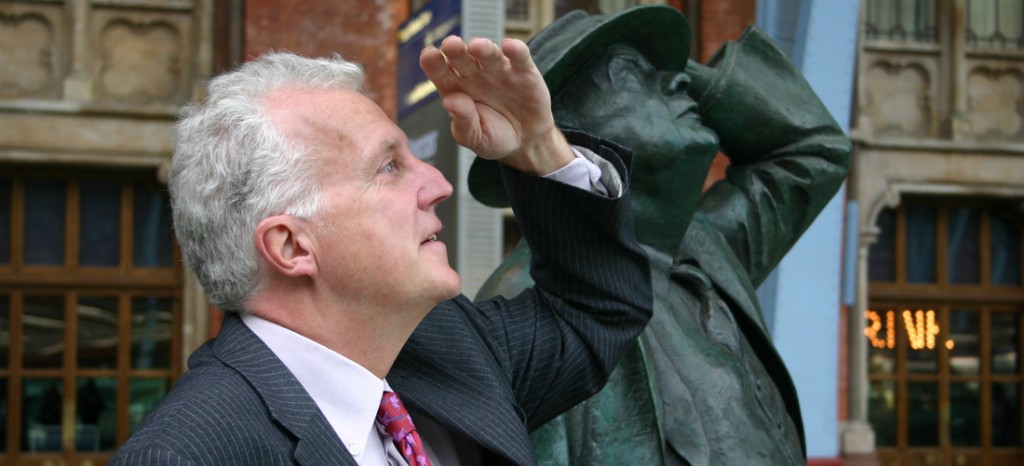The speed with which environmental issues have been wiped off the political agenda in the face of the rising fuel and energy prices may have been predictable but is nonetheless remarkable. The public is caught between Gordon Brown almost dropping on one knee to beg the Saudis to increase production and opposition spokesmen cashing in on the government’s discomfort without offering any alternative whatsoever. No one cynicism about politicians is becoming universal.
Indeed, even those, like me, who are willing to defend politicians in recognition of the difficult job they have to do, are beginning to despair over the lack of any serious reflection about the impact of the rising fuel prices other than the search for short term palliatives. Surely this is an opportunity for the braver ones to get up and say something that views this situation over a slightly longer period than tomorrow’s Daily Mail headlines. For a start, given that both Labour and Conservatives are totally wedded to the idea of the market, is not the rise a perfect example of the market mechanism telling us that fuel is becoming a much sought after commodity because demand is beginning to exceed supply? And surely today’s politicians no longer try to buck the market.
The most dispiriting aspect of the events of the past few weeks is not only the lack of any intellectual rigour and the pandering to the basest immediate political interests, but it is the lack of any insight about the long term situation. For a start, neither party, though, is stating the obvious. If the era of cheap fuel is really at an end, then not only will this have an effect on every mode of transport, but government policies must change in their wake. If transport becomes a more significant expense both for individuals and goods, then minimising the distance that either travel will become an imperative. Planning policies will then need to accommodate this notion. People will no longer want to travel 20 – or even 10 – miles to the nearest supermarket if the money they save is less than the cost of the petrol.
The strongest initial impact will be on aviation There is no doubt that a permanent increase in the cost of flying which, say, doubles a transatlantic fare from an average of £250 to £500 puts the need for a third runway at Heathrow into question. Michael O’Leary, the irascible boss of Ryanair, may sound ever bullish about his company’s future but he may now pay a heavy price for his ‘sod the customer’ attitude that has made. Those stag parties to Estonia will be the first to go, but a recession will also greatly reduce the number of Poles hopping on his planes to come here to work. Will he end up regretting that his company is only
half way through its order for 281 Boeing 737-800s?
For the railways, the outcome of the increase in energy prices, together with the strong possibility of an economic downturn, if not a full blown recession, is more difficult to call. On the one hand, railways do badly in a recession. The relationship between economic growth and rise in the number of passengers on the railway has always been very strong. However, to some extent that link has already been broken. The massive increase in numbers over the past decade has been above the normal trend line, because there are push factors such as the growing congestion on the roads and the fact that more people can afford train travel rather than, say, coaches thanks to the large number of cheap fares available for people booking in advance. For a time, too, during the five years of the fuel tax escalator which ended in 2000, along with the RPI – 1 formula for season tickets and savers which was ended in, until the formula was changed to RPI + 1, the railways were becoming relatively cheaper relative to the cost of motoring.
On the other hand, much railway travel is discretionary and that market could shrink dramatically. Moreover, the rail companies are having to impose above inflation fares rises in order to meet onerous franchise payments. My guess is that passenger growth will tail off and that the operators will come under increasing financial pressure but they will partly be cushioned by the exceptional growth in the past couple of years.
As for the roads, the number of cars travelling on them is likely to stop growing or even reduce, possibly easing pressure on the roads. Investment, therefore, should be channelled ever more towards fuel-efficient means of transport, from walking and cycling to the railways and buses. The business case for new roads may become far less attractive and putative benefit cost ratios could fall dramatically.
There is no evidence that the Department for Transport is looking at any of this. Its policies are still based on Yet, the Department for Transport’s models are still based on the notion that fuel prices will be in the order of $65 – $70 for the whole of the 2010s, half the current price. Admittedly no one predicted the sharp rise in fuel prices, but that does not excuse the complete absence of political debate and discourse on the subject other than pathetic attempt to soften the blow for supposedly deeply suffering motorists. The potential transport revolution is passing the politicians by, even though it will undoubtedly result in major changes in the pattern of demand.
